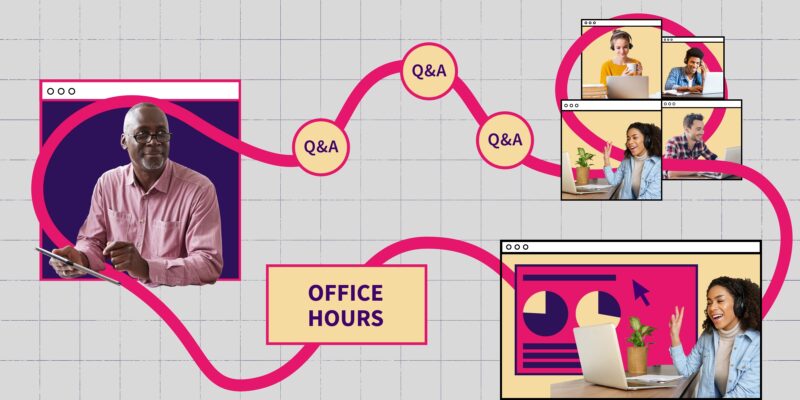National Issues
Will The Observation Of Covid-19 Protocol Render Classroom Teachers Irrelevant? -By Isaac Asabor
The profession of photography is changing again. Now, you don’t even need to own a camera to become a pro; the phone is the number-one way of taking pictures, and the image quality achievable with today’s phones is comparable with Digital Single-Lens Reflex Cameras (DSLRs) from only five years ago.

It is no more news that the relationship between new technologies, employment, and inequality has gained a lot of attention in recent years. Without any iota of exaggeration, not few jobs, or rather professions are facing the threat of being devalued by widespread use of new Information and Communication Technologies (ICTs), including machine learning, digitalization of production, robotics, and automated vehicles.
For instance, Secretarial, administrative and cashier jobs have already been damaged by advances in automation and computing. As for Secretarial-related studies which had highly competitive ratings in the estimations of both prospective students and admission officers working in polytechnics and some universities of technology where it is usually offered as a B.SC or B.ED course, most companies today have become not keen in recruiting anyone that is qualified in Secretarial or Office Administration since it is believed that any prospective job seeker must be computer-literate. Simply put, most people today don’t need Secretaries to perform their jobs in their offices as long as they remain Computer-literate. Against the foregoing backdrop, the need for Secretarial Staff has increasingly being devalued as virtually everyone knows how to type, answer calls and draft letters. Back in the days, to become a Secretary is never a piece of cake particularly when it the fact that Shorthand is a compulsory subject in the course of Studying Secretarial Administration. Without any iota of hyperbole, it is never a field of human endeavor that is left for intellectual laggards.
In a similar vein, never in the history of Journalism has the once enviable profession continued to be hollowed out by structural shifts in technology that have now resulted to significant falls in advertising revenue. Without any iota of exaggeration, publishers; both online and offline are looking to subscriptions to make up the difference but they are more often than not limited by advancement in technology that has opened diverse options for advertisers to showcase their products or services. Taken together, these trends are already leading to the biggest wave of journalistic lay-offs and non-payment of salaries thereby further weakening the ability of publishers to run successful media-related businesses. What it means is that most organizations that couldn’t do without the media in the past today now do without the media as a result of fast innovation in technology.
Analyzed from a different perspective, in bygone days, when large wooden boxes, wet glass plates and an in-depth knowledge of chemistry were the tools of the photographer’s trade, photography was a difficult skill.
As cameras took roughly the form we see them in today, started using film and became more compact and affordable, photography slowly became more accessible, initially as a hobby, and then as a profession. Even then, however, becoming a professional was hard, learning by trial and error when every shot costs money is an expensive business.
In the last decade or so, however, the digital age has created a boom in the number of skilled photographers out there, and as technology moves forward, the technical challenges of photography are shrinking.
As a result, the profession of photography is changing again. Now, you don’t even need to own a camera to become a pro; the phone is the number-one way of taking pictures, and the image quality achievable with today’s phones is comparable with Digital Single-Lens Reflex Cameras (DSLRs) from only five years ago.
Against the foregoing backdrop, what does the future hold for the professional photographer? On first inspection, it’s a dying market; the proliferation of well-equipped camera-phones seems likely to cause a significant dent in demand for photographic services. The average person is becoming increasingly confident to take their own pictures, even at important events such as weddings. In other areas of the industry, press organizations are increasingly turning to amateur contributions. Meanwhile, anyone with a phone, a filter app and a thumb can make a landscape look “pretty”.
The travel agent is one of the first occupations to come to mind when considering what jobs have recently become obsolete due to technology. The work of a travel agent can be a very fun and fulfilling career, but sadly most people no longer have need of them. Many of a travel agent’s duties, such as making reservations, putting together itineraries and even providing recommendations on where to go, can now be done by individuals at home. Online services have allowed travelers to plan every aspect of their trips themselves, giving them little reason to use a travel agent and pay for their services. Some travel agents have managed to stay relevant by offering unparalleled expertise and relying on a loyal customer base, but overall this profession is on the decline due to technology.
At this juncture, it is expedient to ask “Will the Observation of Covid-19 Protocol Render Classroom Teachers Irrelevant? The answer to the foregoing question is unarguably urgently needed as the Covid-19 pandemic situation has posed unprecedented challenges requiring teachers to adapt to teaching online. Until the emergence of Covid-19, online teaching was least considered as a teaching method. The typical teaching situation at school was characterized by students who convened in classrooms according to their timetables and teachers who covered their subjects’ standard content, frequently through formal lecturing. Students were required to listen to their teachers, work individually or in groups, and predominantly reproduce knowledge in assessments.
The fear that teachers that are predominantly disposed to the traditional classroom teaching method will find it difficult to adapt to online teaching method cannot be disputed as a typical online teaching environment is quite different from traditional classroom teaching environment. To provide the best experience possible to students taking lessons online, tools that cut across a fast and reliable Computer, Video Chart Software, Webcam, preferably HD, Microphone, Headphones, and Multiple cameras are needed. Given the fact that the tools that need technical skills to operate are requisite for those who would want to become professional online teachers, it is obvious that there is no way the observation of Covid-19 protocol will not affect professional teachers negatively. How long will the pandemic last? According to WHO, the pandemic has come to stay. One will now reiteratively ask, “Will the Observation of Covid-19 Protocol Render Classroom Teachers Irrelevant?”
While the appropriate answer to the foregoing question is been awaited, the fact remains that the disruptions caused by Covid-19 to everyday life meant that as many as millions of classroom teachers in Nigeria need to update their skills as online method of teaching has come to stay just the same way Covid-19 has come to stay with humanity.
















